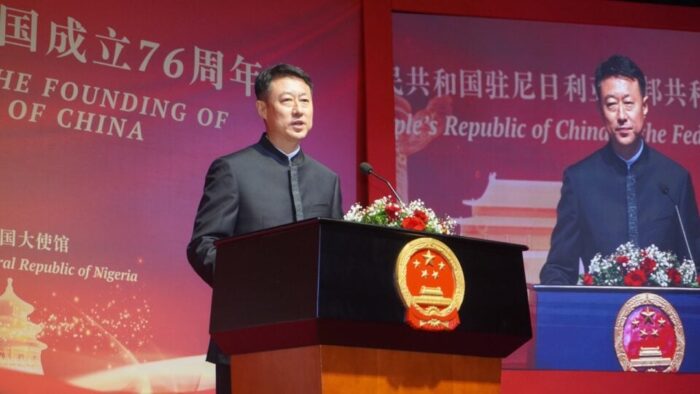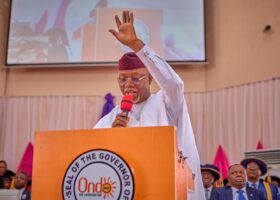China’s Ambassador to Nigeria, Yu Dunhai, has reiterated Beijing’s deepening commitment to its partnership with Nigeria, describing the relationship as a growing “comprehensive strategic partnership” that continues to flourish across political, economic, and cultural domains.
Speaking during a reception in Abuja to mark the 76th anniversary of the founding of the People’s Republic of China, Ambassador Yu framed 2025 as a transformative year not only for China’s domestic development, but also for China-Africa relations and broader global diplomacy.
“This year also marks the 80th anniversary of the United Nations,” Yu said, citing China’s Global Governance Initiative (GGI) as part of Beijing’s effort to contribute “Chinese wisdom and solutions” to pressing international challenges.
The ambassador celebrated China’s progress over the past decades, calling the country’s evolution since 1949 “miraculous,” particularly in the areas of economic growth and social stability.
He credited the leadership of the Communist Party of China for driving two historic achievements: lifting over 800 million citizens out of poverty and achieving sustained national stability.
“In 2024, China’s GDP surpassed $18 trillion, with per capita income exceeding $13,000,” he noted, emphasizing China’s role as a key driver of the global economy.
“For years, China has accounted for over 30% of global economic growth.”
Looking ahead, Yu said China’s next phase of development defined by modernization and national rejuvenation would be rooted in peace, cooperation, and shared prosperity.
He reaffirmed Beijing’s readiness to expand its development partnerships with African nations, especially Nigeria.
“China values Nigeria’s recent endorsement of the Global Governance Initiative,” Yu said.
“We appreciate this support and welcome Nigeria’s growing influence on the global stage.”
Yu also reflected on President Bola Tinubu’s state visit to China last year, which he described as a milestone that elevated bilateral relations to the level of a “comprehensive strategic partnership.”
The ambassador cited multiple projects as evidence of the partnership’s tangible outcomes, including:
- The Lekki Deep Sea Port, which Yu described as a “new national gateway” for Nigeria’s international trade. The project is expected to inject $360 billion into the Nigerian economy and generate 170,000 jobs over the next 45 years.
- The Abuja Water Supply Project, completed in June, which now delivers up to 480,000 cubic meters of clean water daily to serve nearly 3 million people.
Yu also revealed ongoing negotiations for the construction of Africa’s first local insulin production facility in Nigeria, a move aimed at reducing the country’s dependence on imported insulin and positioning Nigeria as a biotechnology hub for the continent.
Highlighting the people-to-people ties between both nations, the ambassador shared the story of Ms. Issah Abiola, Nigeria’s first female train operator trained by the China Civil Engineering Construction Corporation.
Known in China by her Chinese name “Bai Yang,” Abiola recently received the Friendship Envoy Award, becoming one of just six recipients globally.
Yu applauded Nigeria’s decision to include Mandarin Chinese in the national senior secondary school curriculum a step he described as “symbolic of the cultural and educational synergy between our countries.”
Deputy Senate President Barau Jibrin, represented at the event by Senator Babangida Hussaini, echoed the ambassador’s sentiments, describing the relationship between Nigeria and China as a “deepening strategic alliance.” Jibrin noted the symbolic significance of both countries sharing the same national day October 1st and pointed to China’s visible role in Nigeria’s development.
READ ALSO: China-Nigeria Trade Reaches $15.48B in Seven Months
“From roads and railways to power plants and industrial parks, Chinese investments are shaping modern Nigeria,” he said, describing Tinubu’s visit to China as a turning point in bilateral relations.
Jibrin also emphasised opportunities ahead under Nigeria’s 10-Year Development Plan and China’s Belt and Road Initiative, stating that both frameworks are “unlocking new paths to connectivity, trade, and inclusive growth.”
Touching on education and cultural exchange, he said thousands of Nigerian students are now studying in China, gaining vital knowledge and skills. He also noted growing Chinese interest in Nigerian culture, arts, and language.
The Senate Deputy President closed by reaffirming the National Assembly’s commitment to furthering cooperation through parliamentary diplomacy.
In recent months, Nigeria has taken bold steps to strengthen ties with China. Beyond endorsing the GGI, the federal government’s approval of Mandarin as an official foreign language in schools marks a significant step in fostering closer bilateral engagement.





